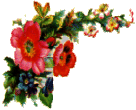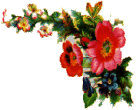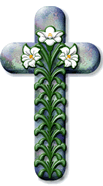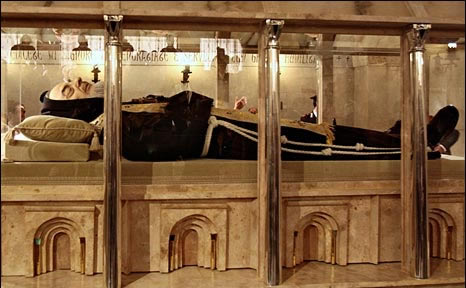A
day in the life of Padre Pio
|
This represents
an imaginary day in the life of Padre Pio but as the
routine of the
friary did not change much it would have been very
much a typical day.
Each picture has a brief commentary with an interesting
anecdote or quote. |
Click on any image
for a larger picture
| |
Padre Pio's
day would begin about 2:30 a.m. when an alarm clock
would ring in his cell. He would make the sign of
the cross, kiss his rosary, glance at the image
of Jesus and Mary and then say a prayer of thanksgiving
to God for the new day. He would get up three hours
before the other friars to prepare himself suitably
for the celebration of Mass. I say he would get
up and not wake up because he slept very little.
Fra Modestino of Pietrelcina, in his book "Testimonies
of Padre Pio", recounts: "One evening
in 1964, I was alone with the Padre by his bed.
Suddenly he said to me: `Listen, my son, pray to
God that I am able to sleep. My eyes hurt and I
am exhausted. It is three years that I have not
slept".
|
| |
Padre Pio at
5:00 a.m. would be at the altar. Crowds of people
anxious to find a place near his altar would already
be waiting for him. The Eucharistic Sacrifice would
last more than an hour. Immersed in the divine mysteries,
Padre Pio would re-live Jesus' Passion. His dialogue
with the eternal was a time of evident suffering,
great emotion, and mystical calm. The holy Mass
was "the fount and goal", "the heart
and centre" of his life. And the people saw
in him the living image of Christ, the light of
the Resurrection.
A spiritual daughter, one day asked Padre Pio:
"Father what is your Mass?" The Padre
answered: "A sacred mingling of Christ's Passion.
My responsibility is unique in the world."
And on another occasion: "Padre what do you
suffer during the Mass?" And he answered: "Everything
that Jesus suffered in His Passion, but unworthily,
and as far as it is possible for a creature".
(Fr. Tarcisio da Cervinara, "The Holy Mass
of Padre Pio").
|
| |
At the end of
holy Mass Padre Pio would return to the sacristy,
preceded and followed by a group of men who wanted
to touch him and see him from close up. Without
talking and still immersed in the divine mysteries
just celebrated, he would renwve the sacred vestments
and would recollect himself in intense prayer of
thanksgiving. He would be aware of nothing around
him. If he could, he would have remained for hours
in that intimate dialogue. And when he tasted all
the sweetness of the immaculate flesh of Jesus,
received in the sacrament, he felt himself in paradise!
Padre Pio at the end of holy Mass, never omitted
to do his thanksgiving. And our Lord would gratify
him with marvellous experiences. In fact, to Padre
Agostino, his confessor, he confided: "Yesterday,
only God knows how much sweetness I experienced,
especially after holy Mass, so much so that I still
feel them. My head and heart were on fire; but it
was fire that did me good. My mouth tasted all the
sweetness of that immaculate flesh of the son of
God". (Letters I).
|
| |
After
havinq heard a Mass in thanksgiving in the internal
chapel of the friary, Padre Pro accompanied by a
fellow friar, would go to the sacristy to hear the
confessions of the men. Then he would go into the
church to hear the women's confessions until 9:00
a.m. The confessional represented for the Saint
of Pietrelcina, the privileged seat from which he
could live his specuzl vocation to reconcile his
brothers and sisters to God, but it was also a source
of indescribable suffering having to hear how his
Jesus was offended
One day Saint Pio of Pietrelcina said to Don Domenico
Labellarte a devout spiritual child: "You must
know, my son, that I tremble every time I am about
to go down to hear confessions." The good Don
Domenico surprised and curious asked him: "Why
is that Father?" Padre Pio answered: "I
tremble because I must minister Christ's blood!"
|
| |
At 9:30 a.m.,
with a surplice and stole, Padre Pio would distribute
Communion to those penitents just absolved of their
sins and those other faithful who wished to receive
the sacred species from his wounded hands. He was
happy to see so many pilgrims approach "the
sacred banquet of the divine Iamb" that he
considered such a powerful remedy against human
weakness, and a "great means to aspire to holy
perfection". He desired however that all approach
the eucharistic table with the desire and the intention
to remove from their hearts all that displeases
the One who becomes bread for us.
To his spiritual daughter Raffaelina Cerase, Padre
Pio wrote: "Let us approach to receive the
bread of angels with great faith and with a great
flame of love in our hearts. Let us await this most
tender lover of our souls in order to be consoled
in this life with the kiss of His mouth. Happy are
we if we succeed in receiving from the Lord the
consolation of this kiss in the present life!".
(Letters II).
|
| |
From the
first years that he finally settled in San Giovanni
Rotondo, Padre Pio was surrounded by a substantial
group of spiritual children. In the visiting room
of the friary, he would hold weekly group meetings
with them in which he would give instructions and
advice on the religious life. However, some of them,
whenever the occasion arose, would approach him
privately and ask him for further counsel. And Padre
Pia would answer them all, happy to see the fruits
of his teachings.
Padre Pio would exhort his spiritual children to
persevere, to be confident and to be calm, He would
repeat to them: "Be firm in your resolutions;
stay in the ship in which He has placed you, and
let the storm and hurricane come. Long live Jesus!;
you will not perish. He may sleep, but in the right
place and at the right time He will awaken to restore
the calm. Do not fear, you are walking on the sea
amidst the wind and waves, but with Jesus".
(Letters III).
|
| |
Padre
Pio surrounded by the crowds and all the pushing
and even fanatical outbursts that be always firmly
scolded, would successfully reach the protection
of the cloister. On the way, women and men of every
age and social standing would be waiting for him,
in the sacristy, in the corridor or in the "St
Francis hall", to ask him for advice, a prayer,
a blessing; to give him a letter or an offering
to give vent to their troubles, to recount their
sufferings. And the stigmatic of the Gargano would
give to all, words of comfort, spiritual direction
and paternal exhortations.
While Padre Pio was going by, a voice called from
the crowd: "Padre, what must I tell my sister,
Rose?". The woman convinced that she could
obtain from him an answer... direct from heaven,
almost shouting repeated: "Padre, what must
I tell my sister Rose?" Padre Pio, to repress
any fanaticism, answered: "Tell her that she
will become a carnation..." and indeed she
soon later met and married a man called Carnation.
(Gennaro Preziuso, Padre Pio, Apostle of the Confessional).
|
| |
At lunch
time the friars summoned by the bell would unite
in the refectory. Padre Pio would join them a little
later having been delayed in the blessing of a car
in the garden or held up by someone talking. Arrived
at his place, he would kneel down with his arms
outstretched, to thank providence for the food he
was about to eat. His prayer would continue until
he ate a few mouthfuls. He would then pass his plate
to the friar sitting next to him and he would remain
to listen to the reading of the Gospel or the Franciscan
Rule.
A fellow friar asked Padre Pio: "Padre , how
are you able to live on so little food?" The
Padre answered: "There are in nature fertile
and non fertile fields. For the former, one grain
of wheat will produce much; for the latter not even
with the best fertilisers will any grain be produced.
It must be the same with the human body or at least
it is so for me." (Testimony from the Process
of Canonisation of Padre Pio).
|
| |
Padre
Pio would make holy the short pause for rest with
the reading of Vespers and Compline. Then he would
remain a few minutes on the veranda of the friary,
with his inseparable rosary in his hands and his
thoughts always turned to God. At 3:00 p.m. he was
again in the sacristy to hear the confessions of
the men. At 5:•00 p.m., from the choir loft,
he would. join in the communal recitation of the
rosary. At 5:30 p.m. he would lead the evening Benediction
and recite the prayer to Mary Most Holy composed
by St. Alphonsus de Liguori.
In reciting every evening "the prayer to Jesus
in the Blessed Sacrament" Padre Pio would be
deeply moved, even to tears. To Padre Agostino of
San Marco in Lamis he wrote: "I often ask myself
if any people exist who do not feel their breast
burning with divine fire, especially when they are
close to him in the Blessed Sacrament. This seems
impossible to me, especially in the case of a priest
or a religious". (Letters I,).
|
| |
Once Vespers
were over; Padre Pio, when the weather was good,
would go into the garden for some fresh air. He
would walk along the path between the row of pine
trees, or he would watch a game of bowling played
by the friars. Then, in the summer, in the shade
of a tree, or in the winter in a room of the friary,
he would spend half an hour in conversation. To
those present he would bring joy and smiles with
his sense of humour and with his anecdotes that
had a moral lesson he would give insights into the
spiritual life.
Padre Pio once recounted that at Foggia, in the
church of St. Anne, a fellow Friar told him loudly
that a doctor friend was arriving to see him. An
elderly lady who had just confessed to Padre Pio,
asked him at once if this friend could visit her
daughter who was ill. Padre Pio answered her that
the friend was a doctor of "philosophy"....The
woman thinking that philosophy was a part of medical
science, commented: "How many illnesses there
are in the world!...Thanks all the same, Padre,
but my daughter is not ill with philosophy".
(Fr. A. Ripabottoni, "Padre Pio Recounts and
Says").
|
| |
During
the course of the day Padre Pio would reserve a
few minutes to talk to prelates, priests, fellow
friars and people from the world of politics and
entertainment who came to San Giovanni Rotondo with
the sole of meeting him and to receive from him
advice and counsel of a practical and spiritual
nature. The Saint of Pietrelcina would recommend
them above all to be faithful to the Gospel and
to manifest in respective daily pastoral or professional
activity a perfect coherence with their professed
faith. In this photo Padre Pio receives the visit
of the President of the Italian Republic, Antonio
Segni.
Among the people from the political
world who frequented Padre Pio was Gerardo De Caro,
who became his spiritual child. One day he asked
Padre Pio to give him a few rules to help him make
progress in the spiritual life. Padre Pio, looking
him straight in the eyes, answered, "Punctuality,
precision, uprightness and... generosity!"
|
| |
During
the days that preceded Christmas, Padre Pio's day
was concentrated on the preparations for this his
favourite feast. Padre Pio would count the days
leading up to this most touching liturgical solemnity
of the year. With words full of love he would formulate
his best wishes for peace, serenity and joy. Before
the crib he would remain for hours in meditation.Then
on the night of the vigil , he would carry the child
Jesus in procession and his eyes would shine with
an inner love and joy that was contagious.
Padre Pio as a small child would model with clay
the little figures for the crib and he would place
them in a small grotto carved out of the wall of
the house and he would prepare, in a very original
way, little lights filling with a few drops of oil
and a wick using the empty shells of snails, that
he carefully chose and emptied, or rather had been
emptied by his friend Luigi Orlando, since he did
not have the courage to do it himself. (G. D. Flumeri,
Padre Pio's Prayer Life , in Italian only).
|
|



.jpg)
.jpg)
.jpg)
.jpg)
.jpg)
.jpg)
.jpg)
.jpg)
.jpg)
.jpg)
.jpg)
.jpg)

